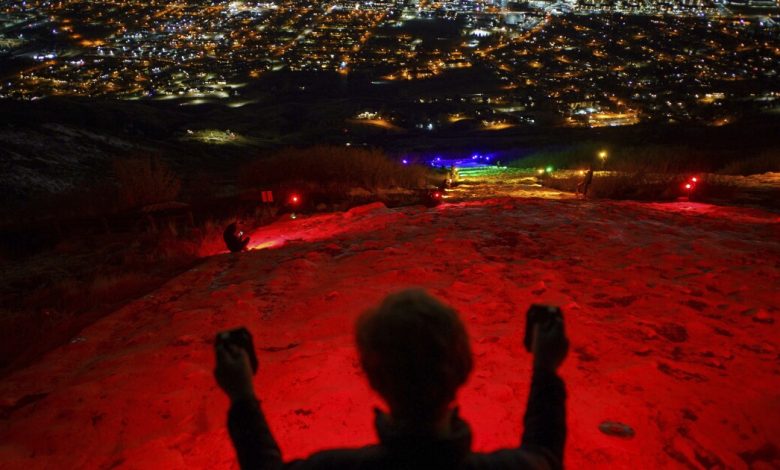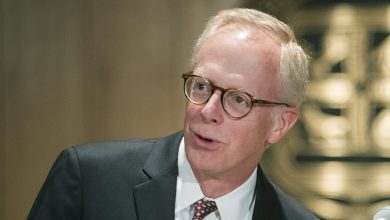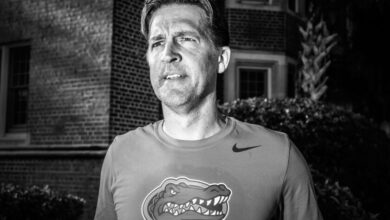At BYU, Opponents of Rules on Same-Sex Couples Welcome Federal Action

[ad_1]
Brigham Young University has faced simmering criticism for years over its treatment of LGBTQ students. News broke last week in The Salt Lake Tribune that the U.S. Department of Education had opened a civil-rights investigation into whether the university, which is operated by the Church of Jesus Christ of Latter-day Saints, is violating the gender-equity law known as Title IX.
Word spread quickly, on and off campus, with critics of the university’s differing standards for heterosexual and LGBTQ students, based on religious grounds, expressing a mix of excitement and tentative apprehension over what such an investigation could mean.
“It felt like a massive relief,” said Calvin Burke, a former BYU student and well-known LGBTQ advocate in the community. “Most people outside of BYU don’t understand how bad things are for queer students there or how many queer students there are at BYU, so it felt like finally someone has heard what’s going on and can hopefully come and help.”
Just short of 1,000 out of 7,600 undergraduates who participated in a recent survey identified themselves as LGBTQ, or about 13 percent, according to a study by two local clinical psychologists.
If the Education Department’s Office for Civil Rights, which is conducting the investigation, finds that BYU violated Title IX by going beyond what it is permitted to do under its religious exemptions, one remotely possible penalty is the university’s loss of access to federal student aid, although that sanction has never been applied.
The outcome of the investigation will reveal just how durable the religious university’s strict rules are in a country that in recent years has become vastly more accepting of its LGBTQ community. The inquiry could also carry ripple effects for students who have long felt vulnerable and pushed aside.
A Strong Legal Position
BYU largely echoes official church policy in forbidding same-sex relationships and marriages, and it has disciplined LGBTQ students for dating and kissing in the past.
BYU’s status as a private religious university means it is exempt from some provisions of Title IX, and its administrators say they don’t expect the investigation to yield any federal action, as the university is within its rights to enforce the church’s policies against same-sex relationships.
The Office for Civil Rights, known as OCR, “has repeatedly recognized BYU’s religious exemption, including in connection with this case,” said a BYU spokesperson, Carri P. Jenkins, in an email. “Therefore, BYU does not anticipate any further action by OCR on this complaint.” According to the Office for Civil Rights’ website, “opening a complaint for investigation in no way implies that OCR has made a determination with regard to the merits of the complaint.”
The office began looking into the university’s treatment of LGBTQ students on October 21, based on a March 2020 complaint that alleged “BYU’s position on same-sex romantic behavior not being compatible with the Honor Code was a violation of Title IX,” Jenkins said. The investigation is one of about 1,400 reviews of American colleges in progress.
In the nearly 50 years since Title IX was enacted, the office has never denied a religious institution’s request for exemption, according to Michael Austin, vice president for academic affairs at the University of Evansville, a Methodist institution in Indiana, and a BYU alumnus. He explained that while most religious universities have one or two exemptions, BYU has far more.
“BYU is going to be in a very strong legal position when they claim that something violates the tenets of the religion, because more than any other school I’m aware of, they are wholly owned by the Church of Jesus Christ of Latter-day Saints,” he said. Given that level of religious oversight, he added, the university would essentially be treated by the courts as “a religious organization that happens to grant degrees.”
To attend BYU, students must first sign its Honor Code, which prohibits behavior that is not in line with church doctrine, such as sexual relations outside of marriage or the consumption of alcohol.
Shortly before the complaint was filed, the BYU administration removed from the code a section titled “homosexual behavior,” a step that many took to mean that LGBTQ students were being given permission to date, kiss, and show romantic affection in same-sex relationships, just as their straight peers were. A few weeks later, however, the university clarified that the removal had been misinterpreted and that “same-sex romantic behavior” is “not compatible with the principles included in the Honor Code.”
Upon receiving notice of the investigation from OCR, the university’s president, Kevin J. Worthen, responded last November in a letter that said the exemptions still apply, even though the section had been removed from the Honor Code.
OCR responded in a letter this month that said “BYU is exempt from these [Title IX] provisions to the extent that application of these provisions conflict with the religious tenets of the controlling religious organization that pertain to sexual orientation and gender identity.”
Austin said he anticipated that the Office for Civil Rights would conclude BYU is operating within its exemptions and not take further action, but that the result depends on the content of the complaint.
“Another possibility is they send a letter saying they’ve gone further there than the exemptions will permit,” Austin said. “Exemptions have to be minimally invasive, so they will say you need to change in this way and BYU will change as absolutely as little as possible to meet those guidelines, but they will meet them. They aren’t going to put their federal financial aid on the line.” He added that he doesn’t think the university’s accreditation is at risk.
‘Something Has Got to Change’
Matty Easton came out as gay in the spring of 2019 while delivering the valedictorian speech before 10,000 fellow graduates of BYU’s College of Family, Home, and Social Sciences. He said he did it to show other LGBTQ students at the university they aren’t alone.
“There’s a lot of people like myself who go to BYU maybe because they don’t understand their sexuality yet, or they do and they are afraid of it, and they want to keep the standards and rules of this religion they’ve been raised up in,” Easton said. “We end up at BYU, where it can be incredibly lonely and isolating knowing that your very identity as a queer person can get you kicked out of the school — make you lose all the academic achievements you’ve worked hard for.”
Easton said the first person he knew as gay at BYU took their own life the same semester they came out, which is one reason he decided to come out in such a public manner. “Something has got to change, and if it doesn’t change, we are going to keep losing lives, and that’s a price I’m not willing to pay,” he said.
While LGBTQ students and their supporters at BYU see the federal investigation as a potential source of relief, many are apprehensive, questioning whether it’ll bring structural change, given the university’s religious exemptions.
“I want to believe that something will come of it, but I honestly have no clue,” said Madi Hawes, a sophomore. “The school, and thus the church, prides itself in, ‘Well, we are protected because of religious belief.’ The church has kind of safeguarded itself, so it makes me wonder what all will be possible that comes out of this investigation.”
The last couple of years at BYU have been rife with controversy. The university held its first approved panel on LGBTQ issues in 2018, but administrators still resist meeting the students’ demands for greater inclusion. Members of Understanding Sexuality, Gender, and Allyship, or USGA, an unofficial club of LGBTQ students and their allies at the university, regularly meet at the local library because they aren’t allowed to do so on campus.
Last year a group of students hiked up a mountain in view of campus to light up the university’s “Y” symbol with rainbow-flag colors in support of the LGBTQ community. Recently, administrators updated the institution’s demonstration policy to bar protests on university-owned portions of the mountain, citing safety concerns to The Salt Lake Tribune. In response, USGA said the lighting of the Y was a peaceful gathering and a demonstration of love for LGBTQ students.
Hawes, who realized she was bisexual while attending the university, said she hopes to make the campus a safer place for LGBTQ students, and disputes critics’ arguments that if such students don’t like BYU policies, they can go elsewhere.
“It’s not like I’m going to a restaurant and I don’t like the food, so I complain about it. The people who are being oppressed shouldn’t have to be the ones to leave — people should just stop being oppressive,” Hawes said. Many LGBTQ students at BYU, she added, do believe in the church’s teachings and should have the option to learn in an environment that supports those beliefs in the same way as their straight peers.
Many LGBTQ students worry about the lack of clarity over what they can and can’t do, especially after the wording explicitly banning same-sex dating was removed from the Honor Code in 2020.
While Bonnie Magland, a BYU senior and USGA’s secretary, said she doubts the investigation will result in action against the university, she is hopeful about what it signifies and feels it gives legitimacy to everything LGBTQ students have been saying for years.
Magland recalls conversations with peers over the years when some have pushed back against what LGBTQ students characterize as the harsh realities of their life on campus. Magland hopes the federal investigation will be seen by administrators and students as proof.
“Over the years that I’ve been here, any attempts at telling LGBTQ students that they belong and that they are welcome have an underlying ‘but not actually,’” Magland said. “I’m hoping that they can now have more legitimate attempts at trying to show the LGBTQ students that they are wanted and welcome.”
[ad_2]
Source link






